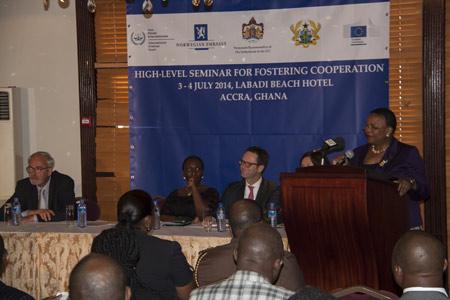Seminar on cooperation with the ICC concludes in Ghana

On 3 and 4 July 2014, a high level seminar for fostering cooperation between the International Criminal Court (ICC) and States Parties to the Rome Statute was held in Accra, Ghana. Government representatives and other high level officials from nine African countries – Angola, Botswana, The Gambia, Ghana, Liberia, Mozambique, Nigeria, Sierra Leone, and Tanzania – as well as Norway and the Netherlands, ICC officials and experts held in-depth discussions on cooperation between the ICC and States Parties, with an emphasis on witness protection and investigations. The seminar highlighted the importance of judicial cooperation nationally, regionally and with the International Criminal Court, and explored avenues on how the capacity of States in this regard could be strengthened.
In her keynote address to open the seminar, ICC First Vice-President Judge Sanji Mmasenono Monageng stated: "The Rome Statute is fundamentally based on the concept of complementarity, under which national jurisdictions and the ICC are both working toward the same goal of ending impunity for the gravest crimes of concern to the humankind. Accordingly, the strengthening of a State's capability to cooperate effectively with the ICC in many cases also translates to improved capacity of national authorities to investigate, prosecute and adjudicate Rome Statute crimes".
Representing the seminar's host state, Ghana's Attorney General and Minister for Justice, H.E. Marietta Brew Appiah-Opong stated: "This seminar aims at stimulating high level in-depth discussions on some of the most relevant issues regarding cooperation between the International Criminal Court and States Parties in respect of the protection of witnesses as well as the connection between national capacity building and international cooperation. Member States would be expected to commit to the full implementation of adopted legislation as soon as possible".
In all of its activities, the ICC relies on the cooperation of States and international organisations, including in arresting and surrendering suspects, seizing and freezing assets, enforcing sentences of imprisonment pronounced by the Court, receiving detainees after their interim release, or relocating witnesses. The Court may enter into arrangements or agreements to provide such cooperation.
The event was organized by the ICC in close cooperation with the Norwegian Embassy to the Kingdom of the Netherlands and the Permanent Representative of the Netherlands to the ICC, funded by the European Commission, the Governments of the Netherlands and Norway, and supported by the Government of Ghana.
The International Criminal Court is an independent, permanent court that tries persons accused of the most serious crimes of concern to the international community as a whole, namely the crime of genocide, crimes against humanity, war crimes and the crime of aggression.
For further information, please contact Fadi El Abdallah, Spokesperson and Head of Public Affairs Unit, International Criminal Court, by telephone at: +31 (0)70 515-9152 or +31 (0)6 46448938 or by e-mail at: [email protected].
You can also follow the Court's activities on YouTube and Twitter